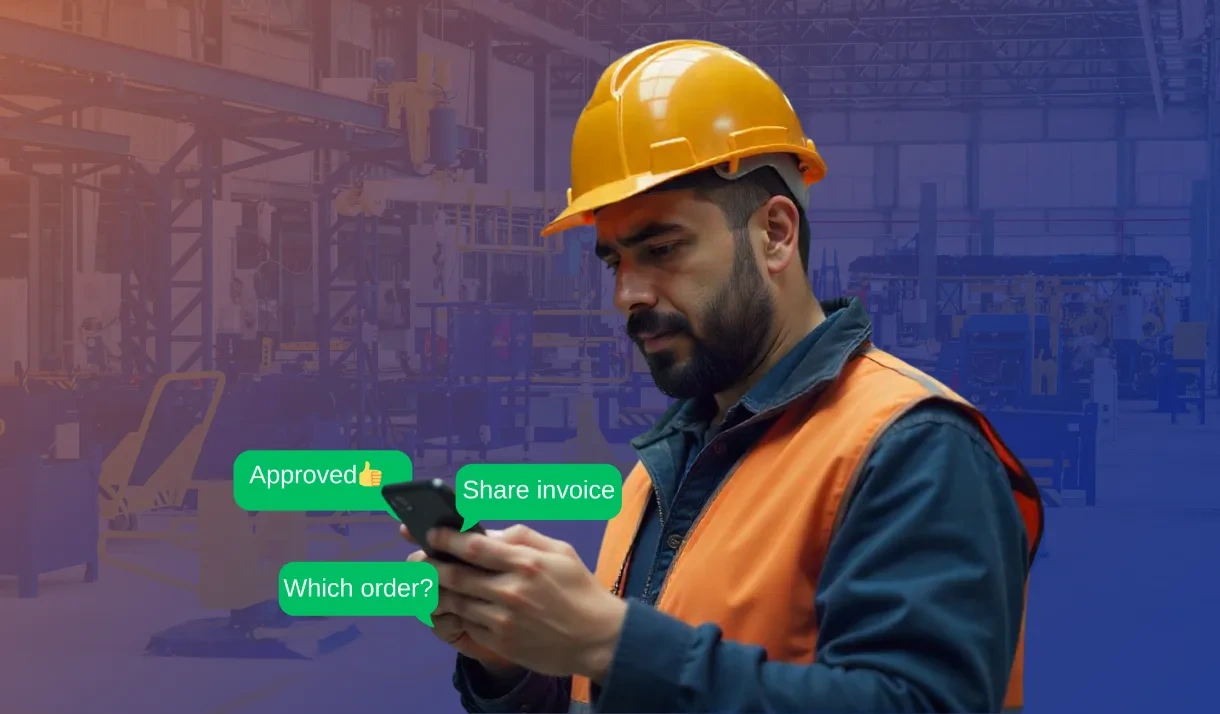Walk into any small or mid-sized factory in India, and you’ll spot the familiar signs: a group chat named “Plant Operations,” “Dispatch Today,” or “Raw Materials.” Inside it, managers, supervisors, storekeepers, and sales teams exchange photos of docket slips, voice notes requesting spares, forwarded Excel screenshots, and last-minute price approvals. A sales exec will be seen forwarding a quotation screenshot to the owner. A dispatch photo sent in the group with the caption “Done boss.”
Most factory owners and managers will agree: we’ve all had that one missing message, that wrong attachment, that untraceable decision which caused a delay, a loss, or worse- a customer walking away.
So why did WhatsApp become the nerve center of the modern Indian factory?
Why WhatsApp Works At First
To be fair, WhatsApp didn’t take over because someone thought it was the perfect tool. It took over because it was the most convenient one.
Everyone already had it. No training, no licensing, no setup. You could click a photo of a delivery slip, send a quick voice note about a part shortage, or forward a price revision in seconds. And in small teams with limited admin bandwidth, speed often wins over process.
It filled the gap. It made things work. And in the early stages, that’s often enough. But for how long?
The Hidden Costs of Chat‑Only Operations
At first, it might be a missed order, then two versions of the same quote go out, then someone reorders raw material by mistake. Soon a critical approval cannot be found, and when an auditor asks for documentation there is nothing structured to show.
As your factory grows, the cracks in this system start to show. The very tool that gives you speed also steals accountability, accuracy and traceability.
- Loss of Accuracy
When multiple people forward slightly different versions of a quotation or parts list, you end up chasing which one is correct. A misplaced decimal or an outdated rate slips through, leading to incorrect orders or cost overruns. - Zero Traceability
Which voice note approved the extra discount on that big order? Who confirmed the change in delivery date? There is no audit trail. If a customer complains or an auditor asks for records, you scramble through thousands of messages or worse, find they have been deleted. - Accountability Gaps
If something goes wrong- short shipment, mixed‑up batches, duplicate purchase, everyone points to the group chat. No one person owns the decision. And it’s always easy to say – “I didn’t see that message.” - Compliance Nightmares
Many factories must comply with export standards or quality certifications. Maintaining records of approvals, test results or corrective actions in a chat app is next to impossible. Fines, rejected shipments or lost certifications can follow.
Growth Makes It More Challenging
The irony is, just when your factory starts picking up momentum, WhatsApp becomes even more dangerous to rely on.
First, the scale makes mistakes costlier. A miscommunicated delivery date can mean losing a repeat client. A missed purchase order can halt production for days. Data gaps start hitting your reputation.
Second, your team is busier than ever. Everyone’s chasing targets, managing fires, getting more done in less time. Nobody wants to pause and adopt a new process. That’s when the idea of switching to a better system feels like “extra work” – even though that’s exactly when it’s needed most.
Managers become so focused on hitting targets that they push back against any “new system” that asks them to stop forwarding messages and start clicking buttons. But it is actually at this tipping point-when the business grows-that structured data, clear approvals, and reliable workflows matter most.
What Streamlined Systems like SourcePro Manufacturing ERP Can Do for You
Now imagine replacing that group chat chaos with a system built specifically for growing manufacturing businesses: simple enough to get started, yet powerful enough to bring structure where it matters most.
Instead of relying on memory or message trails, you work with a clear, step-by-step process: lead to quotation, quotation to order, order to dispatch- every step tracked, every action logged.
- One View of Your Operations
From inquiries to invoices, from material inwards to finished goods dispatch, you can finally see everything in one place. - Mobile-First Simplicity
Approvals, indents, and reports- done from a phone, without needing to go to the office desktop or hunt through paper files. - Smooth, Error-Free Coordination
Your sales team sees live stock, your purchase team sees real requirements, your production team sees exactly what’s next. No overlaps, no second-guessing. - Setup Without Disruption
You don’t have to pause operations to implement it. It’s designed to work with your team, not against their flow. - Better Control, Without Complexity
Whether you’re handling 50 orders a month or scaling to 500, the system scales with you- with approvals, accountability, and visibility built in.
This is how you move from reactive fire-fighting to proactive control.
A system that lets your people stay focused on production, while the backend stays clean, connected, and compliant.
You do not have to have the enterprise solution at first. Today you can also start with a purpose‑built ERP designed for MSMEs. SourcePro offers a Premier ERP made for small and mid-sized manufacturers – with all the functionality you need, and none of the excess you don’t. It doesn’t cost lakhs up front. In fact, the monthly cost is similar to the daily wage of one worker.
Final Thoughts
Chats are casual. Business isn’t.
WhatsApp has served you well to kick‑start your operations. Now it is time to move beyond quick fixes and invest in systems that scale with your ambition. If you are ready to see what life looks like when your operations live in a smart, structured platform instead of a crowded group chat, let’s talk.


